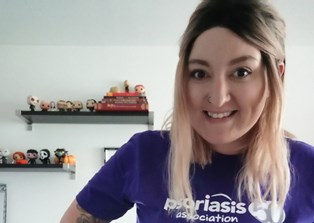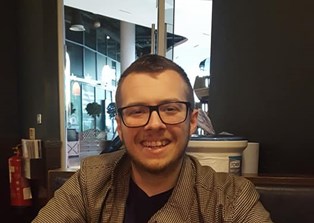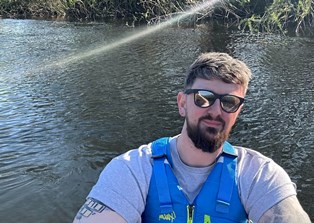Oscar's Story
Oscar had a very tough turbulent time after being diagnosed with a very rare form of psoriasis. He bravely shares his story and proves that things can get better.
I would like to start my story by saying that it does get better.
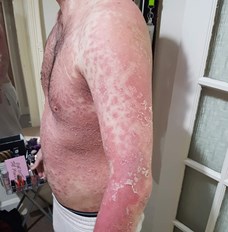
Before my severe flare-up of psoriasis, I recently had a lot of success in my martial arts career. I was, very luckily, selected to represent the TAGB Tae Kwon Do Scotland squad at the Arnold Schwarzenegger Sports Festival in Birmingham – this was one of the high points of my life. I had worked so hard for my chance and nothing could take that away from me.
After a brief spell of injury, I began to fall ill when I had the Covid-19 booster jab in December 2021. At first, my psoriasis began to spread in big plaque scales across my arms and legs. I also had it very bad in my scalp and had found it difficult to do the things I love.
This became very taxing as I had to navigate an overwhelmed NHS GP practice and wait months to get an appointment. After paying to use an app called Push Doctor, I was told that I urgently needed to be seen by a dermatologist. I immediately phoned the practice again and had sent pictures ahead of my condition.
My skin continued to deteriorate, I was unable to work, go out with friends, even go out for a walk with my girlfriend. I couldn’t sleep due to the itchiness, and spent entire nights awake worrying whether or not this awful condition would end. The medication for this was brutal. I had to cover myself head-to-toe in different topical steroids, followed by multiple layers of hydromol (effectively a tub of grease) and special bandages.
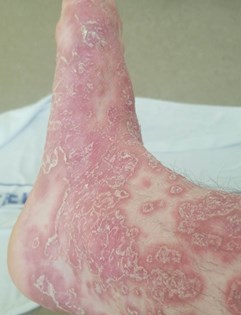
Unluckily, after this, I caught coronavirus and the psoriasis quickly spread over my whole body. I was experiencing constant waves of hot and cold and could barely move. After a lot of visits to my local dermatology clinic, I was diagnosed with erythrodermic psoriasis. This very rare form, I was told, was life threatening because it can stop the regulation of your body temperature and even cause hypothermia.
I had never known discomfort or pain like this. I would often spend nights in tears praying for it to end. I can’t accurately explain the feeling of it, but if I moved too suddenly it felt like I would tear in half. Fiery red planes over my skin burned my body. My girlfriend would often wake up in the middle of the night just to comfort me, making me feel guilty about my condition disrupting her life as well as my own.
After being admitted to hospital, my fingertips and toes began to go cold and blue. The nurses were quickly able to help restore my blood flow and the dermatologist quickly put me on cyclosporin to start removing some of the psoriasis. I was kept going by visits and support from my family and friends.
This shifted some of it, but not much. I was completely incapacitated - I lost my job and my home in Edinburgh because I was unable to pay the bills. Moving in with my girlfriend in the Scottish Borders was the only solution I had. She was, and continues to be, incredibly supportive.
After another two visits to the hospital (one of which over a week), I was prescribed adalimumab biologic injection to reduce the spread of psoriasis. Luckily, this began to work quickly and my skin was less red and itchy.
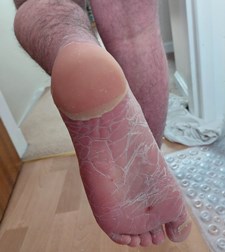
Unfortunately, due to a heatwave, I had managed to get very bad sunburn on my skin (despite minimal exposure and a tonne of factor 50 sun cream) which reactivated the whole process again. My girlfriend called an ambulance and I was taken to hospital again. This setback was very hard to bear as I thought I had gotten over the worst of my condition. In a few short days, the entire soles of my feet peeled off, my whole body was shedding, and I had lost lots of hair.
Luckily my biologic kicked in once again. The psoriasis settled down and I have not had a flare-up since. I would like to pretend that my recovery was 100% successful, but unfortunately this was not the case.
I do still struggle with my skin, particularly the side effects of the topical steroids I took. They left me with some horrendous stretchmarks on my arms, legs and back. I still get overheated very easily and I am struggling with my weight gain. Before all this I was comfortable with my appearance, but I am definitely more self-conscious than I was before and my body serves as a constant reminder of the trauma I experienced. On a more positive note, I have been back doing my martial arts although I have struggled mentally with the fact that I am not as fit and sharp as I was.
One thing I really struggled with was, because it was such a rare form of psoriasis, that there is not a lot of information out there relating to my case. I wish I had more answers about my condition but that’s all part of the struggle. There is no right or wrong way to feel about the situation, but whatever you are going through will improve in time. I am the proof that things can get better – in the hospital I asked the dermatologist just how bad my psoriasis was. He replied, “as bad as it gets.” So if I can begin to recover and learn to manage this condition, so can anyone reading this!
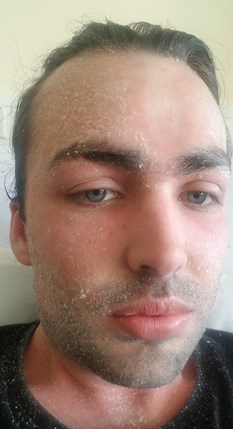
I will get there and so will anyone reading this looking for hope. This attitude will help you cope – things will improve, flare-ups come and flare-ups go. Do not let the condition define you; if somebody gives you a hard time about your appearance, it says far more about them than it does you. There is far more to you than a condition that you were born with.
I genuinely believe that anybody who can come out on the other side of this is a credit out there to all who are suffering. Do not give yourself a hard time for struggling, no matter what stage you are at. You will have good days and bad days - this is totally normal. You will get through it. If I can, you can too.
Erythrodermic psoriasis is a very rare form of psoriasis and requires hospital treatment immediately.
Please visit our page on Pustular Psoriasis for more information.

